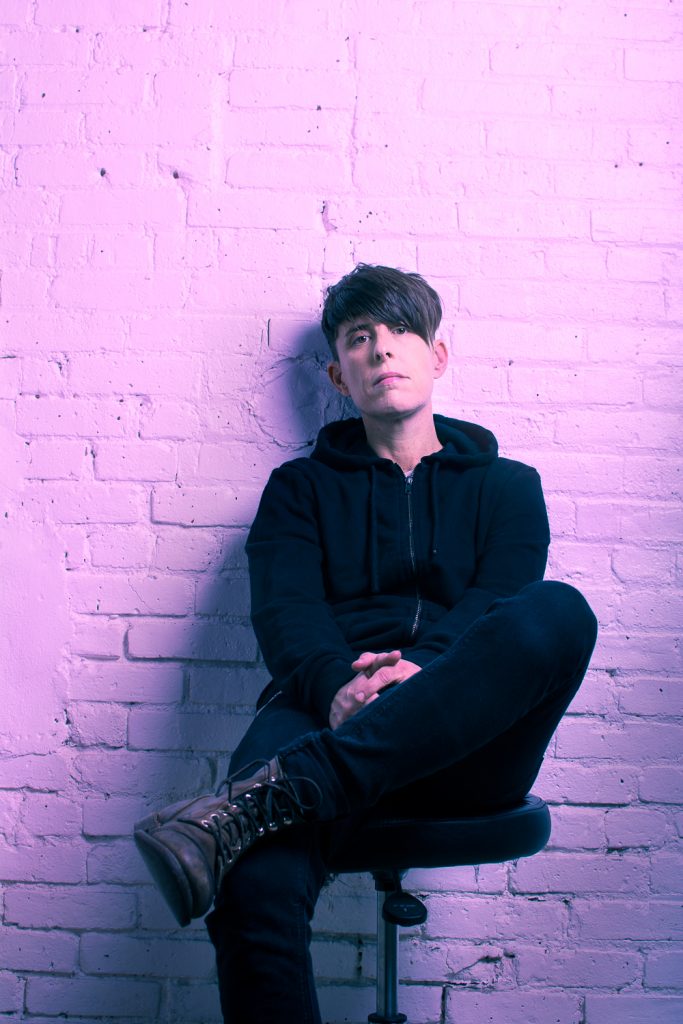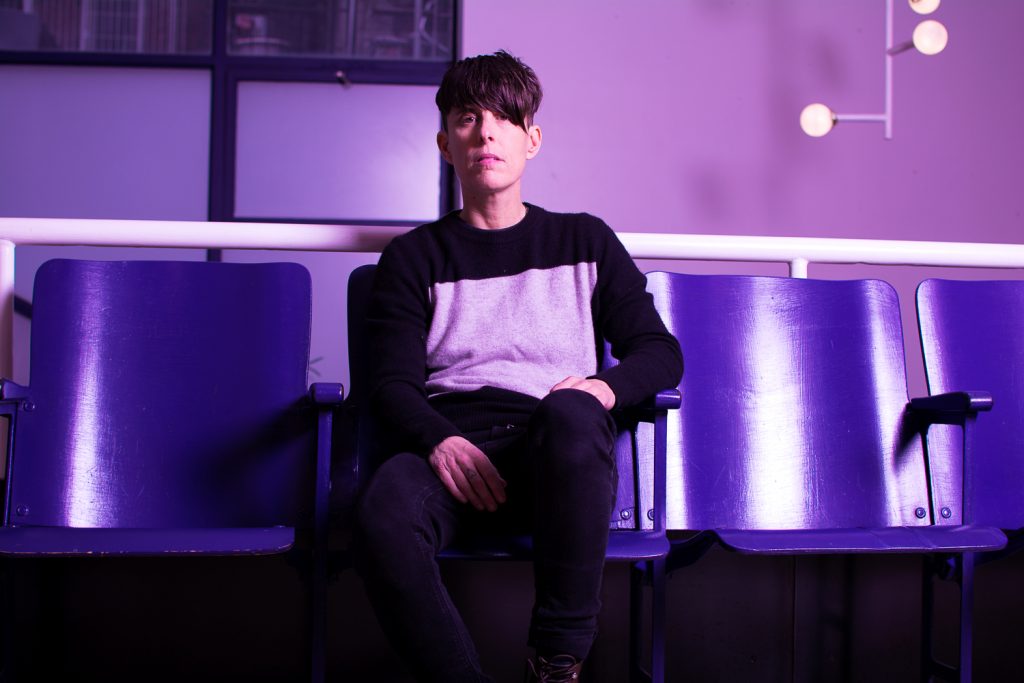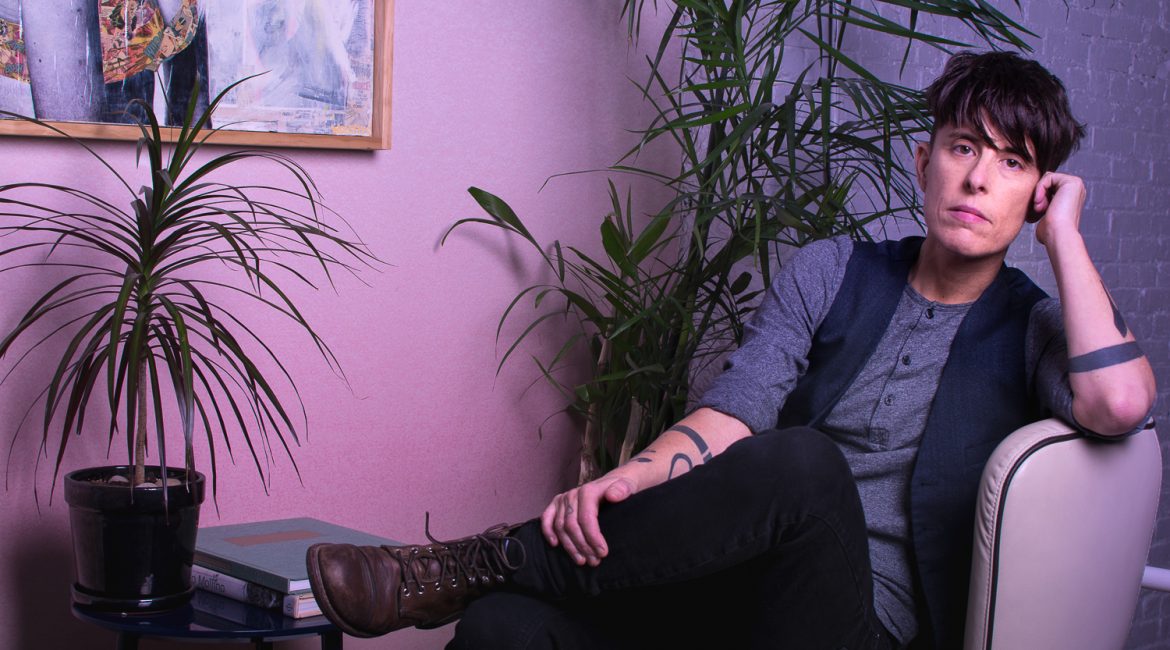Andrea Gibson’s work looks likes poetry, and sounds like poetry, but feels like something much larger, more expansive. Reciting sharp and sublime lines over musical accompaniment, Gibson has made a career out of truth — heartbreak, gender, mental illness, politics, and unending love are all excavated in their performances. Gibson’s newest spoken poetry album, HEY GALAXY, explores the world after the heartbreak of the 2016 election, with the fierce honesty that has come to define their style. In this conversation with Posture’s Arts Editor Maya Harder-Montoya, Gibson speaks about health, queer healing, and unraveling learned gender behaviors.

Photo by Morgan T Stuart
As you might know, a huge focus for Posture is the intersectionality of identity. I’d be interested to hear a little bit about the journey of your identity, whether that’s your gender, your identity as an artist, and how those things intersect and inform each other.
I grew up in a really tiny, working-class town in the woods of rural Maine. I think that has always stuck with me as part of my identity. I also grew up in the Baptist Church. Then I ended up going to a conservative Catholic college — it was there where I really fell in love with writing. Coming out changed so much about my identity because everything that I hadn’t questioned previously, I just began questioning. For example, I was still identifying as a Republican. I was still identifying as Christian. It just opened up all these questions in me because I thought if the world is wrong about this one thing in terms of queerness being this awful sin, then maybe it’s wrong about all this other stuff, too..
Where are all the intersections? There’s so many. I have Lyme disease. Just the experience of living with a chronic illness also intermingles with my gender as well. For example, some days I can’t carry my own suitcase and my femme partner will be carrying all of our luggage. Just the process of maneuvering around my gender and that experience is humbling, and then also liberating in this way. It feels like a new way to queer our life experience.
I think also for so many queer people, there’s all of the stages to coming out that intersect — realizing that sexuality and gender are two separate things, that each actually have their own journey, and their own coming out experience.
The first time I heard the word genderqueer, I just felt like somebody had handed me a part of myself that I had never had language for. It was fascinating. That’s one of the things that I love about the intersection of writing, poetry, and gender. When I began to write, I was writing to figure out who I was.
I just finished re-watching the video for your piece, Your Life, which definitely speaks specifically about that experience of growing up not only queer, but outside of the gender binary. Can you speak a little bit about the creation of that piece? What was it like to write that and create that video?
I’d just returned from Sweden, and they have a third pronoun, a national non-binary pronoun there, which is hen, H-E-N. I had gender on my mind a lot when I wrote it, and have been recently having a new experience of my gender that’s not rooted in pain anymore. It’s something that is a lot of fun. I feel celebratory about it.
Playful?
Yes! Even when I’m having an experience that in the past might’ve been an awful experience — going through TSA or someone questioning what gender I am — all of that has finally reached this point in my life where I don’t feel much pain about it. I wish I could go back and say, “Listen, this is going to be hard, excruciating sometimes, but this is also going to be so beautiful.” That’s where the piece came from. The video for that piece was a collaboration with a bunch of friends, and then friends’ friends, because genderqueer means so many different things to different people.
In the vein of that piece, what does healing mean to a queer experience? How do you experience healing?
Healing, that’s such a good question. I definitely don’t live my life ever expecting some end point of absolute peace and enlightenment, at least not while I’m still alive. Hopefully wherever I go after is very peaceful. I think that for me it’s a constant process. One of the most significant factors in healing for me is to pay attention to how much gentleness or how much compassion I can have with myself —about my queerness, or illness, or mental health. How I’m defining the past changes with healing, because then the lens on the past is changing as well. At one point I may have thought, “God, this is the end of my life,” or, “This is the worst thing that could ever happen,” but it also propelled me into the more wonderful things that would come. I think a lot of it is about that lens, and how I’m experiencing the past, and what way the past is living in my body. Is it still traumatic? Does my body have a memory and still ringing with turmoil, or do I have a different story around it? That’s for my individual being.
Illness was a harder thing for me to talk about on stage than anything I’ve ever spoken about, even sexual assault, any deeply personal thing. I had more shame talking publicly about having an illness than anything else. I think some of that actually is connected to gender.

Photo by Morgan T Stuart
In that context, do you mean— in the same way that you mentioned your partner carrying the suitcases, was this process about unpacking what masculinity meant to you, or you thought it was supposed to mean?
Yeah, and a lot of it isn’t necessarily healthy. A lot of it is this taught patriarchy riddling its way through me. It’s also something that is in some ways embarrassing to talk about because I don’t want to admit that the patriarchy has got that kind of hold on me. For example, riding with my partner, and we bought a tandem bicycle because at one point, when I was really sick, I couldn’t pedal. It was a shame point for me, and also I was trying to figure out, “God, what is this?”
It’s also funny to think about those experiences too, because I think as a queer person, when you’re negotiating your visibility — I think about you and your partner on this tandem bicycle, and if I had watched you guys roll through a park, I would be like, “Oh my god, that’s adorable. Look at those two queers on a tandem bicycle.”
I know, it’s even more queer! We are way more queer now, and that’s got to be good. Anything that will make us more queer is only positive.
I think something that’s really interesting about taking to task all of these issues is that the notion of radical honesty is inherently a very queer thing. I think something that people really respond to in your work is that honesty. I’d love to hear you speak about this notion that when you present a poem to somebody, you’re confronting the accessibility of meaning, that there’s a solution to a poem, or that there’s something that your audience supposed to “get” out of it.
I feel like when I first started writing, I felt like I had to have a lot of answers, I had to know a lot. As I’ve gotten older, I feel like I knew less every year I’m alive. I’m just more curious. More commonly in my writing style now, I’m just telling a story. People can take from it what it means to them and come up with their own answers, or even better, come up with their own questions afterwards.
When does a poem become a poem?
My writing process is really strange. I don’t write sitting down. I write pacing a room and yelling things, or singing things, and just making a lot of sounds. I know the emotion, I know what I want to write about, and I don’t necessarily know the words. I know the rhythm and can feel the emotional arc of the poem. Then the last part is actually the most work for me where I’m puzzling it all together. It’s almost mathematical at the end. That’s my least favorite part about it. I don’t know if there’s any way to describe how I know it’s done. I just have a peaceful sensation come over me. I feel calm because my writing process is really, really hyper, almost manic, and then afterwards calm floods over me.
I’ve noticed your work has a really unique relationship to music. When you describe your writing process, it makes sense to me that there’s almost a tonality or an arc to what you’re doing that in my mind reminds me of music. There’s often music in the background as well when you read, yes?
Yeah, there is, which is not very common in spoken word. It started happening because when I started touring a lot, I started touring with a lot of musicians and made a lot of musician friends and discovered that I felt much happier on stage if there were people up there with me. If I was making art with other people, it just has always inspired me more than making art alone. I just started loving collaborating with people.
Spoken poetry is wild because it’s an art form that requires you to be really transparent and really honest, but if you’re putting on in any way, if your emotion isn’t sincere, if you’re not really feeling what you’re saying, then it’s hard for the audience to watch. I basically ask the universe for connection. I don’t think the audience ever really knows how much of the poem they pull out of a poet because the energy of a poetry audience can be really electric. On a great night I’ll feel like I’m hardly doing any work and they’re doing most of it.
When was the last time you read something that took your breath away?
The last time I read something that took my breath away. God, just a few days ago I was reading a book of poetry by Donte Collins called Autopsy. The whole book, much is about his mother’s death. It’s so stunning.
For more information please visit andreagibson.org.
Editorial Credits:
Photographer: Morgan T Stuart
Senior Photo Director: Asher Torres
Join the Posture community and become an official member! Membership includes our special annual print edition ($20 value), free and/or discounted entry to all Posture events in NYC (including upcoming mixers, panel discussions, and networking opportunities), special offers from our partners, personal updates from the Posture team, and more. Learn more here.

